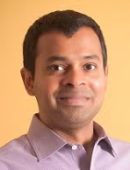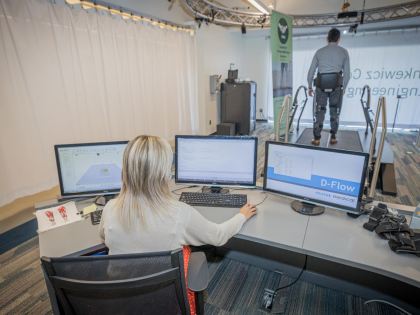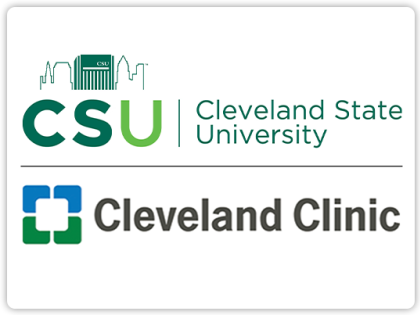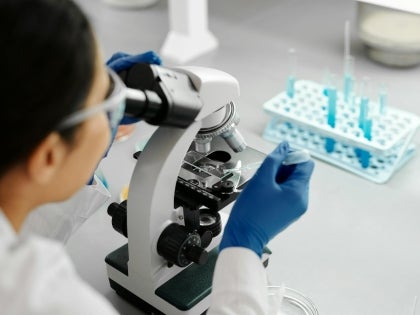Department of Chemical and Biomedical Engineering
Contact Info
Mailing Address
Chemical and Biomedical Engineering Department Washkewicz College of Engineering
Cleveland State University
2121 Euclid Ave., FH 455
Cleveland, Ohio 44115-2214
Campus Location
Fenn Hall Room 455
1960 East 24th Street
Phone: 216-687-2532
Fax: 216-686-9220
che@csuohio.edu
Contact
Kathleen Sessions, Administrative Coordinator
Phone: 216-687-4602
k.sessions@csuohio.edu
Applied Biomedical Engineering Doctoral Program

The Doctoral Program in Applied Biomedical Engineering (ABE) is a collaborative program between the Washkewicz College of Engineering of CSU and the Department of Biomedical Engineering of the world-renowned Cleveland Clinic. The ABE program is a specialization within the college-wide Doctor of Philosophy in Engineering program.
The program provides a foundation built on fundamentals in the life sciences, mathematics, and core biomedical engineering topics. In-depth knowledge in the specific field of interest is gained from advanced courses in engineering and sciences.
The major objective of advanced graduate studies in engineering, computer science or data science is to enhance the student’s preparation for a career as a professional in industry, education or research. The doctoral program is designed to strengthen the individual’s ability to apply creative leadership in the solution of important and complex technological problems. Graduates of the doctoral program have assumed positions in industry, government agencies, and educational institutions.
The Occupational Employment and Wage Statistics from the U.S. Bureau of Labor Statistics indicates Ohio has one of the highest employments for biomedical engineers, with 1,470 employed as of 2024. There is great demand for biomedical engineers, as the U.S. Bureau of Labor Statistics projects a 7% increase from 2023-2033, faster than average for all occupations.
A minimum of ninety (90) credits beyond the bachelor’s degree, including course credits, research credits, and flexible credits. A minimum of sixty (60) credits beyond the master's degree. Students will be assigned an interim advisor and must pass the qualifying exam, candidacy exam, and doctoral dissertation.
Related Links:
- ABE Plan of Study
- Approved Advanced Engineering Mathematics Courses
- Approved Research Communications Courses
- Doctor of Philosophy (PhD) in Engineering Page
Advising
When a student is admitted, an interim advisor is assigned in his/her specialization to assist the student in completing a preliminary study plan. The interim advisor is usually the person in charge of the specialization area.
Qualifying Exam
The purpose of the doctoral qualifying examination is to evaluate a prospective student’s mastery of the subject matters that are fundamental to the chosen engineering discipline/concentration beyond what is demonstrated by the grades obtained prior to entering the doctoral program. Exams will be over 5 topics:
- BME 753 Cell and Tissue Biology
- BME 824 Foundations of Biomedical Physiology
- BME 758 Medical Devices
- BME 770 Biomedical Signal Processing
- Your choice of elective
Candidacy Exam
The purpose of the doctoral candidacy examination is to assess a doctoral student’s maturity and preparation to continue independent research in a specific research topic. The candidacy exam report should be written as a research proposal. It should include the following:
- One page project summary
- ~25 pages of project description including:
- Overall goal
- 2-3 specific aims/objectives
- Hypotheses and significance
- Background (< 5 pages)
- Preliminary data
- Research plan including experimental details, expected outcomes and alternative approaches
- Brief conclusion
Related Links:
- Engineering Doctoral Dissertation Proposal Approval Form
- PhD Candidacy Evaluation Form (for committee use)
Post-Candidacy Exam
We expect doctoral students to follow these guidelines: Steps for Graduating as a Doctoral Student.
Dissertation
The dissertation, a concentrated, in-depth, independent study of an appropriate engineering problem, is the most distinguishing feature of doctoral study.
Related Links:
- Dissertation Signature Form Format
- PhD Dissertation Evaluation Form (for committee use)
- Thesis and Dissertation Format Guidelines
Publication Requirements
Prior to the defense, at least one manuscript must be accepted for publication in a peer-reviewed journal and at least one manuscript must be submitted.
Electives
Minimum 12 credit hours of chemical or biomedical engineering electives, 500 level or above.
The 40+ faculty include members from the Departments of Chemical and Biomedical Engineering, Electrical Engineering and Computer Science, Mechanical Engineering, Chemistry, and Physics at CSU, and Cleveland Clinic adjunct as well. The Michael Schwartz Library provides a research guide for faculty and students in Biomedical Engineering. Our research focus areas in Biomedical Engineering Biomaterials, Biomechanics, Medical Devices, and Tissue Engineering.
Learn more about chemical and biomedical research here
All students interested in Graduate Assistantships must meet and maintain the requirements specified by the College of Graduate Studies as described in this Catalog.
Research assistantships are provided through sponsored research activities; the number available at a given time is dependent on the research activity within the College. Interested students are encouraged to discuss the availability of assistantships and potential research projects with the program director, department chairs, and faculty as soon as possible.
Teaching assistantships are provided by individual departments to provide assistance with classroom and laboratory courses. Responsibilities can include conducting classroom recitation sessions, setting up laboratory experiments, tutoring students in class work, grading, monitoring tests, and related activities. For further information, students should contact the respective department chairs.
All graduate teaching assistants who are international students are required to pass an English Language Proficiency Examination, which is administered by the University Testing Center. Students are expected to work a maximum of twenty hours per week on their assistantship assignments unless fewer hours are specified under the terms of their contracts.
Embark on a journey of discovery and innovation with Cleveland State's Doctoral Program in Applied Biomedical Engineering. Experience a supportive educational environment that blends foundational concepts with cutting-edge technologies, preparing you for a successful career in biomedical engineering or advanced studies.
The handbook for Doctor of Philosophy provides a general guideline and procedures for doctoral students. The official procedures are outlined in the Graduate Catalog. For more information, please contact the program director. For additional questions, see the FAQs.
Doctor of Philosophy in Engineering Handbook
Doctor of Philosophy Frequently Asked Questions
Program Director

Chandra Kothapalli
Doctoral Program Director
Fenn Hall 455
(216)-687-2562
c.kothapalli@csuohio.edu
Request Information
Contact Info
Mailing Address
Chemical and Biomedical Engineering Department Washkewicz College of Engineering
Cleveland State University
2121 Euclid Ave., FH 455
Cleveland, Ohio 44115-2214
Campus Location
Fenn Hall Room 455
1960 East 24th Street
Phone: 216-687-2532
Fax: 216-686-9220
che@csuohio.edu
Contact
Kathleen Sessions, Administrative Coordinator
Phone: 216-687-4602
k.sessions@csuohio.edu




